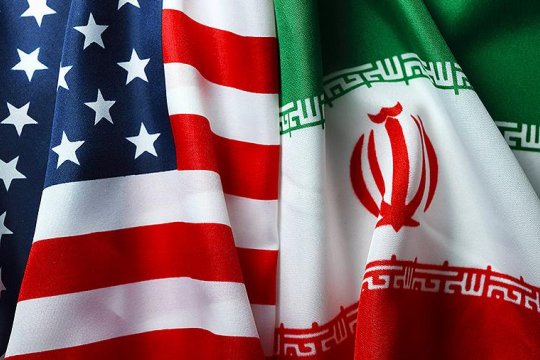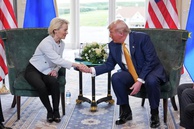American sanctions and how to confront them
The Islamic Republic of Iran (IRI) today, as in the past 40 years of its existence, is in the global spotlight as the focus of major political and economic developments.
As you know, on May 8, US President Donald Trump announced the withdrawal of the United States from the nuclear deal - the Joint Comprehensive Plan of Action (JCPOA) – and the resumption of the sanctions regime against Iran.
On August 7, the United States introduced the first anti-Iranian sanctions package that envisages restrictions on the purchase of Iranian cars, gold and metals. The sanctions also affected Iranian companies specializing in aluminum, graphite, coal, and steel, as well as those manufacturing computer programs for industrial enterprises.
On November 4, the United States will launch a second package that will deal a blow to the Iranian energy sector, in the first place, to the oil and gas industry and related industries, and will affect major transactions, that is, the IRI’s banking system.
Undoubtedly, this is a major attack on the Iranian economy. If we recall the period from 2011 to 2016, back then such international sanctions nearly threw it into an abyss in just a few months. However, today the situation is somewhat different. The anti-Iranian sanctions announced by Trump have lost their international status.
Unlike in those days, when due to Tehran's "nuclear" persistence the entire world rose against it, today Trump's anti-Iran initiative is not supported by anyone. The White House administration counts only on the financial and economic pressure on the disobedient and the obstinate who do not want to join the campaign against the IRI.
And these turned out to be quite a few. As they met in Vienna in July, the five participants in the nuclear deal with Iran (Russia, China, Britain, France, Germany) agreed to protect the five countries’companies from the impact of US sanctions. Russian Foreign Minister Sergei Lavrov said that the parties had also agreed to establish methods of maintaining trade relations with Iran which "would not depend on the whims of the United States."
On August 7, immediately after the introduction of American sanctions against the Islamic Republic of Iran, the European Union adopted the so-called ‘blocking’ regulation which invalidates American sanctions against Iran on its territory, bans European companies from observing them and prohibits the implementation of any foreign court rulings adopted on the basis of these sanctions.
The coming into force of this regulation also allows all European organizations to claim compensation in court for damage inflicted as a result of implementation of these sanctions from persons responsible for this (referring to US authorities).
In late August, the EU began to discuss the possibility of creating an independent payment system, which would protect the European business from US sanctions against Iran. The project may involve central banks of France and Germany.
Moreover, at the end of August, the European Commission (EC) approved financial assistance to Iran to the amount of 50 million euros to solve the "key economic and social problems" of the Islamic Republic of Iran. The first tranche amounted to 18 million euros, which will be channeled "for projects in support of sustainable economic and social development in the Islamic Republic of Iran," with 8 million euros allocated to Iranian private companies. Measures to support the Iranian private sector include assistance to Iranian small and medium-sized businesses, development of production and marketing chains, and technical assistance to the Iranian Trade Promotion Organization. Though small, the sums are important.
The EU will support Iran as long as the country is committed to "full and effective" compliance with the "nuclear deal", which stipulates the lifting of sanctions, the executive body of the European Union specifies.
Despite measures to support Iran, the desire to preserve the Joint Comprehensive Plan of Action and the EU's protests against anti-Iranian sanctions, large European and transnational companies do not really believe in the European Union being able to counteract the United States. Experts say that judging by the experience of the past, when the European Union put up resistance after unilateral actions by the White House, these not quite effective "threats" are about all the "resistance" Europe can mount, since the Iranian market, despite all its attractiveness, can not be compared with the American one. Robert Einhorn, Senior Fellow at the Brookings Institution in Washington, former advisor to the US Secretary of State, said: "Foreign companies are already experiencing difficulty doing business with Iran, and if all these difficulties – non-transparent rules, corruption, poor management, etc. – become aggravated further by the risk of being cut off from the US market and the US financial system, then no reasoning from European politicians will work."
Right now, three months before the Americans introduce the main portion of sanctions, many large companies are leaving the IRI. In the oil sector - this is the French oil and gas giant Total. [1]
Fully aware of the situation, the Iranian leadership relies on cooperation with small and medium-sized foreign enterprises which are not so connected with the United States. Goliam Reza Ansari, the Iranian Deputy Foreign Minister for Economic Affairs, said recently: "There are 23 million small and medium-sized businesses in Europe, and they could assist us in bypassing US sanctions." We must use the potential of European enterprises to meet our economic needs in times of trouble. We are planning to create a working group of experts to promote such enterprises throughout the country. "
Many countries back Tehran's anti-sanctions measures. They are prepared to buy oil from Iran, to invest in projects, to provide know-how and technology. First of all, in the oil and gas sector.
The Chinese economic analyst Kingji Su sayvili said that the Iranian economy is able to overcome US sanctions with minimal difficulties, since these measures are not supported by the international community. The Chinese expert emphasized that after the arrival of sanctions many major economies, including European countries, China and Russia, retained or even strengthened economic relations with Iran.
Indeed, the director of the Department of International Cooperation of China Petroleum and Chemical Industry Federation (CPCIF) said that China will continue to import Iranian oil, despite US sanctions. He underscored that the Chinese market and many other Asian markets strongly depend on Iranian oil. According to The Wall Street Journal (WSJ), the number one buyer of Iranian oil – China, which acquires about a quarter of its oil supplies, is unlikely to cut down on its purchases.
In turn, Investment Director of the Iranian National Petrochemical Company (NPC) Hossein Alimorad said that the amount of Chinese investments in the Iranian oil and petrochemical industry had not changed after the US withdrew from the nuclear deal. As Mr. Alimorad announced recently, the NPC has reached an agreement with a consortium of companies from China and the Philippines regarding a $ 7 billion investment in the petrochemical industry in Iran.
Moreover, Mohammad Mostafavi, Director of Investment of the National Iranian Oil Company (NIOC), said that China National Petroleum Corporation (CNPC) together with the Iranian Petropars can take over from Total, which has 50.1% of the stake in the joint project for the development of the 11th phase of the South Pars gas field, if the French company leaves Iran.
German company ADL recently signed an agreement on cooperation in the oil refining sector with the Iranian oil company Sepahan (SOC). The goal is to share technical know-how and knowledge to improve the quality of products, including industrial oils and lubricants. ADL will begin to implement this ambitious plan in cooperation with its Swiss and Austrian partners.
South Korea (ROK) said in mid-August that Seoul will provide financial support to companies affected by new sanctions against Iran, and will look into the possibility of doing business in alternative markets so as to minimize losses to the local economy. It is clear that South Korea, having bought 147 million barrels of oil from Iran in 2017, is more than interested in expanding oil business with it.
Undoubtedly, international support for Iran as it tries to battle Trump's sanctions is of great value. However, perhaps no less important are the internal economic measures that Tehran is taking to repel, or at least soften the blow to the key sector of its economy - the oil and gas extraction and processing industries.
Oil import substitution
Leaders of the Islamic Republic of Iran are stepping up measures to ensure import substitution. Thus, the Iranian Oil Ministry has banned the import of 84 types of equipment for the oil industry on the grounds that such equipment can be produced domestically.
Among the equipment and products prohibited for importation are wellhead equipment, desalination facilities, anticorrosive substances, sulfur recovery catalysts, wellhead control panels, and others.
Can the Iranians solve the problem of import substitution in the oil industry, while ensuring the necessary modernization of the entire oil and gas sector?
New sanctions against Iran have created severe challenges for Iran's oil and gas production and its petrochemical industry.
However, it should be noted that the IRI, which was under American sanctions ever since the 1979 Islamic Revolution, has been developing its own production of oil and gas equipment. This kind of work was particularly intensive the period from 2010 to 2016, when anti-Iranian sanctions were the toughest.
The head of the Iranian oil company in southern regions Hamid Bovard said in 2013 that Iranian enterprises were producing oil and gas equipment and developing prototypes for launching into production of about seven thousand items. Mr. Howard expressed confidence that such oil and gas equipment as gas pumps, turbines, ball valves and compressors will be key to the restoration of Iran's oil industry. By that time, eight hundred projects had been launched, with investments reaching about $ 15.5 billion. All of them aim to increase the recovery rate of crude oil and oil extraction.
Today, amid the increasing pressure from the Trump administration on Iran, measures to counteract sanctions are intensifying. According to Director of the Petrochemical Company Jam Said Shirdel, the company's specialists, in cooperation with other Iranian companies, have developed and produced 1,000 types of products and equipment for petrochemicals which were previously purchased abroad. He added that in the next two years the company will produce 20,000 types of petrochemical products.
According to Reza Khayyamyan, head of the Association of Equipment Manufacturers of Iranian Oil Companies, the Iranian producers can provide technical services and produce 80% of advanced oil equipment for the development of oil extraction and processing projects. Mr. Hayamyan said this industry employs more than 50 Iranian companies. New contracts worth more than $ 6 billion will soon be signed with local oil extraction and refining companies.
Mr. Hayamyan made it clear that import substitution of oil and gas equipment is on the list of priorities of the Ministry of Oil, which is planning to roll out 14,000 major parts.
As we see, Iran is set on mobilizing its own resources. For one, Secretary of Iran's Supreme National Security Council Ali Shamkhani said recently that the Iranian private sector plays an important role in counteracting the economic war, which was launched against Iran by the Trump administration.
Mohammad Hosseini, member of the Board of Trustees of the National Development Fund of Iran (NDF), said that Fund will allocate 12% of financial resources to counter US sanctions against Iran.
However, it is too early to talk about a profound modernization of the entire oil and gas complex on the basis of state-of-the-art technologies. As it happens, the most advanced technologies, know-how, innovations in the oil and gas and petrochemical industry, which mark dramatic breakthroughs in this industry and its overall renovation, are concentrated and receive special protection in the laboratories of just a few of the largest oil and gas companies, which, alas, are not ready to share these technologies with Iran.
Economy and politics under sanctions
In general, the economic situation in Iran before Trump announced anti-Iranian sanctions regime was not in its best condition. But in connection with the implementation of the Joint Comprehensive Plan of Action there were hopes and faith in a better future.
Now the situation has become worse because of sanctions. The rial rate has fallen, which provoked a rush for buying dollars. This further accelerated the collapse of the Iranian rial. Compared to January, when one dollar on the black market sold for 43 thousand rials, at the end of August it trade for 107 thousand. The official rate for this period decreased from about 36 thousand to 42 thousand.
In the meantime, the opposition is seizing on every opportunity to put the blame for the current situation on President Hassan Rouhani and his liberal reform Cabinet.
In late July, opposition MPs used their constitutional right to summon the president for making a report on the effectiveness of his activities. They gave President Rouhani a month to prepare the answers to their questions and explain to them why the government had done nothing to put an end of the smuggling of goods that damages production, what caused the fall of the Iranian rial, and what triggered economic recession and rising unemployment.
On August 25 President Rouhani addressed the Majlis. In particular, he said: "We are not afraid of America or economic problems. We will overcome all difficulties <...>. You can talk about unemployment, foreign currency, recession and smuggling. I think that the problem is people's views on the future <...>. People are not afraid of the US, they are afraid of our differences. If they see that we are united, they will believe that the problems will be solved," the president said. At the same time, he acknowledged that part of the country's population "had lost faith in the future of the IRI and doubts its power".
The president’s report did not satisfy Deputies of the Mejlis, who expressed their discontent with the work of Rouhani and his government. In addition to that, the MPs struck a blow to the government's makeup by securing the dismissal of the Minister of Economy and Finance Masoud Karbasian, Minister of Labor, Social Welfare and Cooperative Affairs Ali Rabiyyi. Dismissed earlier was the head of the Central Bank, Valiollah Seif. Abdolnasser Hemmati was appointed instead.
Thus, the political situation in Iran is no longer stable being marred by visible signs of a schism within the ruling elite. However, it would be premature to suggest a crisis of the Iranian regime. The American sanctions have jeopardized the positions of only President Rouhani and his team, which was ready for a dialogue with the West. The growing political weakness of President Rouhani and his government has given a chance to his hardline opponents to strengthen their positions and exert a significant influence on the policy of the Islamic Republic of Iran at home and abroad.
For now, removal of Rouhani is not on the agenda. Supreme leader Ayatollah Khamenei, fearing an internal political explosion, is supporting the president. However, given the situation and increasing pressure from the opposition, Rouhani’s policies (both domestic and foreign) may change, though not in the direction of reforms and liberalization.
Whether Tehran will agree to new talks with Washington, to compromises on nuclear missile programs is difficult to predict. For today, it is 100% no. This would mean a ‘political death’ for Rouhani and for the supreme leader Khamenei as well. What will happen next is difficult to say. Much will depend on the ability to retain the Joint Comprehensive Plan of Action and, most importantly, on the ability of all opponents of Trump's anti-Iran sanctions to confront them financially and economically.
However, Ayatollah Khamenei is rather pessimistic about this. He said on August 29 that Iran should give up hopes that Europe will save a nuclear deal. In addition, he added two important things. First, the Joint Comprehensive Plan of Action is not a goal, but a means, and Iran, if it finds that the Plan has ceased to meet Iranian interests, will reject it. And the second: Iran has no intention of negotiating a new agreement with the US at any level because of the "obscenity" of such talks.
Indeed, there are no conditions and no incentives for Iran entering new talks on nuclear missile issues,
Even in case of the worst of scenarios, if the IRI economy faces serious problems, the most radical groups concentrating around the political opponents of Rouhani may come to power in Tehran. These forces will not even consider the issue of negotiations with the US. The Islamic Republic of Iran will yet again become a "besieged fortress", but this is unlikely to affect foreign policy ambitions, especially in the region. On the contrary, they will grow under the leadership of anti-Western politicians and IRGC, forming a foundation for the military and political instability in the region.
The opinion of the author may not coincide with the position of the Editorial Board
[1] Total is getting ready to leave Iran before November 4. The company is developing the South Pars gas field. Total has already invested in it app. 50 million dollars. The French make it no secret that they do not want to anger Washington. The $ 2 billion project is under threat, but these losses are nothing in comparison with the fines that could be imposed on the violators of sanctions by the US Treasury, and other consequences. The most serious threat is the "cut-off" from the US financial system. For many large companies, this threat is even worse than billions in fines. For example, over 90% of all financial transactions at Total pass through US banks.
[2] Wellhead equipment is a set of equipment designed for tying casing strings, sealing the wellhead (annular space, internal tubing cavity, well production diversion) during drilling, well workover and well operation mode regulation.
read more in our Telegram-channel https://t.me/The_International_Affairs

 15:17 24.09.2018 •
15:17 24.09.2018 •



























